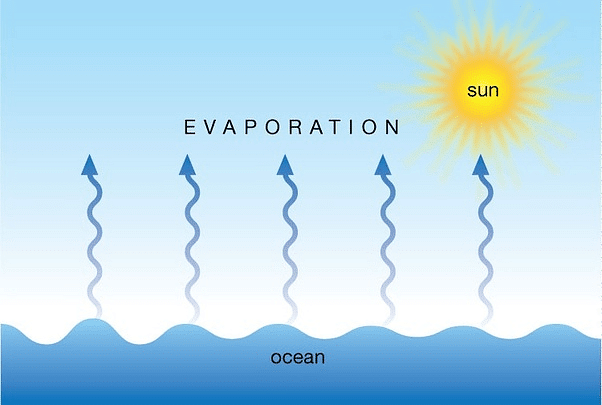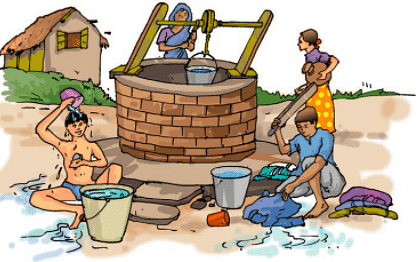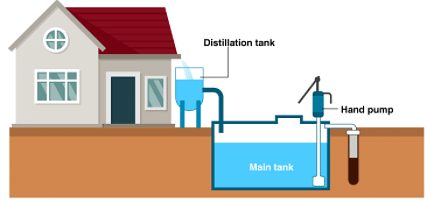NCERT Exemplar Solutions: Water | Science Class 6 PDF Download
| Table of contents |

|
| Multiple Choice Questions |

|
| Very Short Answer Type Questions |

|
| Short Answer Type Questions |

|
| Long Answer Type Questions |

|
Multiple Choice Questions
Q1: Which of the following activity does not involve the use of water?
(a) Washing clothes
(b) Bathing
(c) Cleaning utensils
(d) Drying wet clothes
 View Answer
View AnswerAns: (d)
Drying wet clothes, water gets converted into vapour form. Whereas washing, bathing and cleaning utensils are the activities which require the use of water.
Q2: In which of the following activities will you use a minimum amount of water?
(a) Bathing
(b) Brushing teeth
(c) Washing clothes
(d) Mopping a room
 View Answer
View AnswerAns: (b)
Bathing, washing clothes and mopping a room will require a large amount of water. Brushing teeth requires a minimum amount of water.
Q3: The quantity of water required to produce one page of your book is
(a) one bucket
(b) ten buckets
(c) two glasses
(d) few drops.
 View Answer
View AnswerAns: (c)
To make one sheet of paper requires two glasses of water.
Q4: Water in our tap comes from a
(a) river
(b) lake
(c) well
(d) river, lake or well
 View Answer
View AnswerAns: (d)
Water in our tap comes from rivers, lakes or wells. Water is routed through water treatment plants before it gets supplied through taps. The water drawn from these sources is fit for consumption.
Q5: In which of the following cases evaporation of water will be the slowest?
(a) A tray of water kept in sunlight.
(b) A kettle of water kept on a burner.
(c) A glass of water kept in a room.
(d) A bucket of water kept on rooftop.
 View Answer
View AnswerAns: (c)
 Evaporation Evaporation is directly proportional to temperature when temperature increases, evaporation also increases. The temperature in the room will be lower than compared to the temperatures of sunlight, burner and rooftop. So, a glass of water kept in a room has the slowest water evaporation.
Evaporation Evaporation is directly proportional to temperature when temperature increases, evaporation also increases. The temperature in the room will be lower than compared to the temperatures of sunlight, burner and rooftop. So, a glass of water kept in a room has the slowest water evaporation.
Q6: Transpiration is a process in which plants
(a) receive water from soil
(b) absorb water vapour from air
(c) prepare food from water
(d) release water vapour
 View Answer
View AnswerAns: (d)
Transpiration is a process when the water is lost in the form of vapour which when parts of a plant (mainly leaves) are exposed is termed as transpiration. The loss of water due to transpiration is quite high.
Q7: Clouds are
(a) tiny drops of water floating in the air
(b) a mixture of dust and water vapour
(c) particles of water vapour
(d) raindrops in the air.
 View Answer
View AnswerAns: (a)
Water vapour present in the air condenses to form tiny droplets of water floating in the air which appear to us like clouds. Later these tiny water droplets are formed into larger sized water drops and then get converted to rainfall.
Q8: Wells are fed by
(a) pond water
(b) lake water
(c) rainwater
(d) groundwater
 View Answer
View AnswerAns: (d)
Lakes, ponds, rivers and other water bodies are filled up by rainwater. Some rainwater is evaporated back to air. The rest, the soil absorbs the water into the ground and becomes available as groundwater. Hence, wells are fed by this groundwater.
Q9: Floods cause extensive damage to
(a) crops
(b) property and human life
(c) domestic animals
(d) all of the above
 View Answer
View AnswerAns: (d)
Due to heavy rains, the water level rises in rivers, lakes and ponds. This water then spreads over a large area causing floods. In turn crop fields, forests, villages and cities get submerged underwater. Hence, flood causes extensive damage to crops, domestic animals, property and human life.
Q10: “Catch water where it falls” is the basic idea behind
(a) recycling of water
(b) making dams to store water
(c) rainwater harvesting
(d) condensation of water vapour.
 View Answer
View AnswerAns: (c)
Rainwater harvesting is a method used to collect rainwater. By storing the water, we can increase the availability of water which is collected and stored for later use.
Very Short Answer Type Questions
Q11: Look at fig 14.1 Write down activities shown in this figure in which water is being used.
Write down activities shown in this figure in which water is being used.
 View Answer
View AnswerThe activities shown in the given figure in which water is being used are:
- Water is used for bathing.
- Water is used for washing clothes.
- Water is lifted from the well to store water and for drinking purposes.
Q12: Write any two activities which require more than a bucket of water.
 View Answer
View AnswerThe two activities which require more than a bucket of water are:
- For irrigation purposes, we require more water.
- For washing a large number of clothes.
Q13: Write any two activities which require less than one bucket of water.
 View Answer
View AnswerThe two activities which require less than one bucket of water are:
- For brushing teeth.
- For washing hands.
Short Answer Type Questions
Q14: Why do wet clothes placed on a clothesline get dry after some time? Explain.
 View Answer
View AnswerWet clothes placed on a clothesline get dry after some time because on exposing to sunlight, firstly water present in wet clothes gets converted into water vapour due to evaporation and as a result clothes get dry after some time.
Q15: Water kept in sunlight gets heat from the sun and is evaporated. But how does water kept under the shade of a tree also get evaporated? Explain.
 View Answer
View AnswerWater gets evaporated when kept under the shade of a tree during daytime due to the air around the tree also gets heated up from the presence of sunlight so water gets evaporated from the heated air.
Q16: How do the areas covered with concrete affect the availability of groundwater?
 View Answer
View AnswerAreas covered with concrete affect the availability of groundwater because it reduces the entry of rainwater into the ground, which in turn reduces the availability of groundwater.
Q17: Why is there a need for conserving water? Give two reasons.
 View Answer
View AnswerThere is a need for conserving water because:
- With the rise in population, the availability of water is decreasing. The demand for water is increasing day by day. Hence, we need to conserve water for the future.
- The level of groundwater is decreasing drastically due to the change in climate which results in limited usage of water. This would lead to extreme water scarcity and hence we should conserve water for the next generations.
Q18: Fill in the blanks selecting words from, the following list.
Snow, rain, clouds, vapour, evaporation, transpiration.
Water, as ______ goes into atmosphere by the processes of ______ and ______ and forms ______, which on condensation fall in the form of ______ and ______.
 View Answer
View AnswerWater, as vapour goes into the atmosphere by the processes of evaporation and transpiration and forms clouds, which on condensation fall in the form of snow and rain.
Long Answer Type Questions
Q19: Most of the water that falls on the land as rain and snow, sooner or later goes back to a sea or an ocean. Explain how it happens?
 View Answer
View AnswerMost of the water that falls on the land as rain and snow sooner or later goes back to a sea or an ocean because the water that falls on the land as snow melts during summers and flows into the rivers and streams, from there it goes into the sea or oceans. Some water enters into the ground and becomes available to us as groundwater. The groundwater is pumped out for domestic, irrigation and industrial use, which eventually goes into rivers and finally into the seas or oceans.
Q20: Draw a diagram to show how seawater reaches a lake or pond.
 View Answer
View AnswerHere is the diagram which shows the seawater reaching a lake or a pond:

Q21: Dissolve two spoons of common salt in half a cup of water. Now if you want to get the salt back, what will you do?
 View Answer
View AnswerTo get the salt back from the water we have two methods to do:
- Water can be removed from the salt solution by heating it on a stove.
- Or by keeping it in the sun on a plate for a few hours for evaporation.
Evaporation is a slow conversion of water into its vapour state. Once the water gets evaporated, we get the salt back.
Q22: Explain the process of rooftop rainwater harvesting with the help of a suitable diagram.
 View Answer
View AnswerRooftop rainwater harvesting – is a method where rainwater is collected from the rooftop to a storage tank, through pipes. This water needs to be filtered before using because it may contain some soil from the roof. Instead of collecting rainwater directly in the tank, the pipes can go directly into a pit in the ground. This then enters into the soil to recharge or refill the groundwater.
Here is the diagram which shows the process of rooftop rainwater harvesting:
|
100 videos|261 docs|49 tests
|
FAQs on NCERT Exemplar Solutions: Water - Science Class 6
| 1. What is the importance of water in our daily lives? |  |
| 2. How does water pollution affect the environment? |  |
| 3. What are the main sources of water pollution? |  |
| 4. Why is it important to conserve water? |  |
| 5. What are some effective methods for water conservation at home? |  |

|
Explore Courses for Class 6 exam
|

|

















